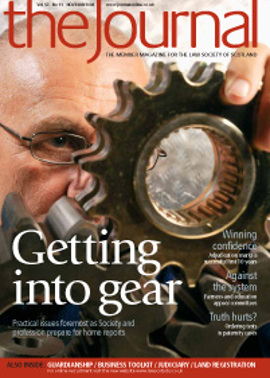Scottish Solicitors' Discipline Tribunal

Alastair Keith Christie
A complaint was made by the Council of the Law Society of Scotland against Alastair Keith Christie, solicitor, of Cullen Kilshaw, Cuddy Bridge, Peebles (“the respondent”). The Tribunal found the respondent guilty of professional misconduct in respect of his failure to respond timeously, openly and accurately to the reasonable enquiries made of him and the statutory notice served upon him by the Society in connection with a complaint from a client. The Tribunal censured the respondent and fined him in the sum of £500.
Solicitors’ failure to respond to the Society hampers the Society in the performance of its statutory duty and brings the profession into disrepute. The respondent failed to reply to a number of letters between May and October 2007. The Tribunal considered that his failure to respond over a period of five and a half months amounted to professional misconduct. The respondent explained that he did not respond because he thought that he had dealt with the matter by sending the papers, but he should have responded to the Society and explained why he was not responding. Solicitors have a duty to assist the Society and co-operate with the investigation. The Tribunal considered a censure plus a fine of £500 to be sufficient sanction.
James McRae
A complaint was made by the Council of the Law Society of Scotland against James McRae, solicitor, formerly at 35 Hawkcraig Road, Aberdour, Burntisland, Fife; now at PO Box 14333, Burntisland, Fife KY3 0WT (“the respondent”). The Tribunal found the respondent guilty of professional misconduct in respect of his failure to respond to correspondence from other solicitors, his repeated failure to respond to correspondence from the Society, and his failure to obtemper statutory notices. The Tribunal censured the respondent, fined the respondent the sum of £1,000 and directed in terms of s 53 (5) of the Solicitors (Scotland) Act 1980 that any practising certificate held or issued to the respondent shall be subject to such restriction as will limit him to providing legal services to members of the armed forces within the system of military discipline and courts martial and that for a period of 10 years.
All solicitors have a duty to respond timeously, openly and accurately to correspondence from the Society and correspondence from fellow agents. The Tribunal was concerned that in this case the respondent had failed to reply to a number of different agents and to the Society in respect of three different cases over periods ranging from 7-10 months. The Tribunal noted that the errors made by the respondent happened when he entered into areas of work which were not familiar to him. It also noted that the respondent had a specialisation in the military discipline and considered that it was appropriate to restrict his practising certificate to these particular areas of work. The Tribunal accordingly restricted his practising certificate so that he can only provide legal services to members of the armed forces within the system of military discipline and courts martial. The Tribunal considered that a period of 10 years’ restriction was appropriate. This period would, in the public interest, emphasise the importance of him not being tempted to practise in the areas where his abilities and experience fell short of the standards expected of solicitors in practice. The Tribunal also considered it was appropriate to impose a fine in the sum of £1,000.
Steven Brown
A complaint was made by the Council of the Law Society of Scotland against Steven Brown, independent qualified conveyancer and independent executry practitioner, Scottish Conveyancing Services, 297 Main Street, Wishaw, Lanarkshire (“the respondent”). The Tribunal found the respondent guilty of professional misconduct in respect of his failure to record deeds timeously. The Tribunal censured the respondent.
The respondent pled guilty to the averments of fact, averments of duty and averments of professional misconduct in the complaint as amended. The Tribunal had a discussion as to whether or not the respondent’s conduct was serious and reprehensible enough to amount to professional misconduct. It involved two delays in recording deeds. It was conceded before the Tribunal that the standards applying to independent qualified conveyancers were the same as those expected of lawyers in respect of the duty to record deeds timeously. It was clear from the submissions made on behalf of the respondent that he did not have systems in place in order to protect the public interest. The Tribunal also considered it significant that in respect of both matters the failure only came to light due to complaints from the clients. The consequences of the respondent’s actions caused extreme inconvenience to clients and resulted in his clients and their lenders being put at risk. In the circumstances, the Tribunal considered that the respondent’s conduct did amount to professional misconduct.
The Tribunal noted that the respondent had already paid compensation and had his fees abated in respect of inadequate professional services findings relating to the failure. The Tribunal also noted that the respondent had now put systems in place to ensure that this did not happen again. The Tribunal considered that a censure would be sufficient penalty.
In this issue
- Support where it's needed
- Prevention or cure?
- Gearing up for change
- A time for support
- Foreign companies and the Registers
- Sensitive relations
- New course for the courts
- Adjudication – 10 years on
- Jack's story
- Professional Practice Committee
- Sourcing our future
- Data security begins at home
- Going equipped
- Bonus round
- Nothing But Delivery
- Checking out checklists
- The final word
- Redundancy: an age old issue?
- Cohabitation update
- Inventive judging?
- Scottish Solicitors' Discipline Tribunal
- Website review
- Book reviews
- Beating the credit crunch
- Keeping a clean sheet
- Battening down in buy-to-let






